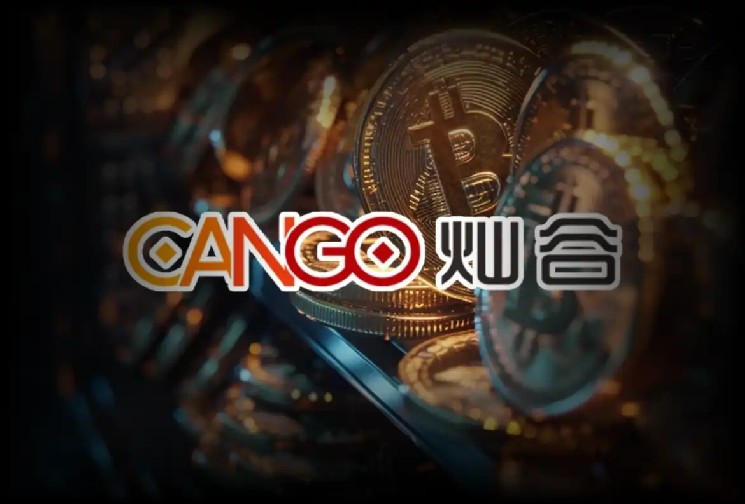In a move that perhaps surprised many onlookers, Cango Inc., a company traditionally known for its automotive transaction services, has rapidly become a notable player in the world of cryptocurrency mining. This strategic pivot highlights the increasing trend of diverse companies exploring opportunities within the digital asset space. The latest report from the company reveals significant progress in its venture, particularly concerning its Cango Bitcoin mining operations.
What Does Cango’s April Mining Report Reveal?
According to a recent press release disseminated via PR Newswire, Cango’s efforts in the Bitcoin mining sector yielded impressive results in April. The company successfully mined 470 Bitcoin (BTC) during the month. This figure underscores the operational scale and efficiency they have achieved since committing to this new business line. What’s particularly noteworthy from the report is that Cango chose not to sell any of the Bitcoin mined in April. This decision suggests a deliberate strategy to accumulate BTC, indicating a bullish long-term outlook on the cryptocurrency’s value.
Why Did Cango Get Into Bitcoin Mining?
Cango’s foray into Bitcoin mining began in earnest with a substantial investment. The company acquired Bitcoin mining machines valued at approximately $256 million from Bitmain, one of the leading manufacturers of cryptocurrency mining hardware. This massive investment signaled a serious commitment to establishing a significant presence in the mining industry. For a company rooted in automotive services, this pivot represents a strategic diversification aimed at leveraging capital in a high-growth, albeit volatile, sector. The potential benefits include:
- Revenue Diversification: Moving beyond traditional automotive services reduces reliance on a single market.
- Potential for High Returns: Successful mining operations can generate significant revenue, especially during periods of high Bitcoin prices.
- Asset Accumulation: Holding mined BTC allows the company to benefit from potential future price appreciation.
- Leveraging Capital: Deploying significant capital into mining infrastructure can generate returns in a different economic cycle compared to automotive.
What is the Significance of Cango’s Current BTC Holdings?
As of the end of April, Cango’s total BTC holdings reached an impressive 2,944.8 BTC. This figure is a crucial indicator of the company’s accumulating digital asset reserves. To put this into perspective, at current market prices (which are subject to constant fluctuation), this holding represents a significant value on Cango’s balance sheet. This substantial amount firmly places Cango among public companies with considerable institutional Bitcoin holdings. While not on the same scale as giants like MicroStrategy, it signifies a growing trend of non-crypto native companies adding Bitcoin to their treasuries.
Holding nearly 3,000 BTC demonstrates a strong conviction in Bitcoin’s long-term store-of-value proposition and its potential as a digital reserve asset. For investors and market observers, tracking the BTC holdings of public companies like Cango provides insight into the pace and scale of institutional adoption.
Navigating the Challenges of Being a Crypto Mining Company
While the April mining results are positive, operating as a crypto mining company comes with its unique set of challenges. These challenges require careful management and strategic planning:
- Energy Costs: Bitcoin mining is energy-intensive. The cost and availability of power are critical factors affecting profitability.
- Hardware Management: Mining machines require maintenance, consume significant power, and can become obsolete as newer, more efficient models are released.
- Mining Difficulty: As more miners join the network, the difficulty of mining Bitcoin increases, meaning more computing power is needed to mine the same amount of BTC.
- Regulatory Environment: The regulatory landscape for cryptocurrency mining varies globally and can change rapidly, potentially impacting operations.
- Market Volatility: The value of the mined BTC is subject to the volatile cryptocurrency market, affecting the revenue generated when BTC is sold or the value of holdings.
Cango, like other large-scale miners, must constantly optimize its operations, secure favorable energy contracts, and stay ahead of technological advancements and regulatory shifts to maintain profitability.
How Does Cango’s Strategy Compare to Other Institutional Players?
Cango’s approach of directly engaging in Bitcoin mining for accumulation differs slightly from companies that primarily buy BTC as a treasury reserve asset (like MicroStrategy). It aligns more closely with other dedicated mining companies (like Marathon Digital Holdings or Riot Platforms), although Cango has the unique background of its automotive business. This dual identity presents both opportunities and complexities. It allows Cango to potentially diversify its business model significantly but also requires managing two distinct and complex industries.
The decision to hold the mined BTC rather than sell it immediately is a strategy shared by many long-term focused miners and institutional holders who believe in Bitcoin’s future appreciation. It requires strong balance sheet management and conviction during market downturns.
What Actionable Insights Can We Take From Cango’s Mining Success?
Cango’s journey from automotive services to a significant crypto mining company offers several takeaways:
- Strategic Diversification: Companies can explore seemingly unrelated high-growth sectors to diversify revenue streams and asset bases.
- Long-Term Vision: A substantial investment like $256M in mining hardware and the decision to hold mined BTC indicate a long-term perspective on the value of digital assets.
- Scale Matters in Mining: Large-scale operations, enabled by significant capital investment, are often necessary to compete effectively in the current mining environment.
- Adaptability is Key: Cango’s pivot demonstrates the importance of corporate adaptability in response to evolving market opportunities.
For individuals interested in the crypto space, observing the strategies of companies like Cango provides valuable insights into institutional confidence and operational approaches within the ecosystem.
Concluding Thoughts on Cango’s BTC Accumulation
Cango’s report for April 2024 highlights a successful month for its Bitcoin mining operations, adding 470 BTC to its reserves and bringing its total Cango BTC holdings to 2,944.8. This performance, coupled with the strategic decision not to sell, reinforces the company’s commitment to accumulating Bitcoin as a long-term asset. As more companies, regardless of their traditional industry, explore ways to participate in the digital asset economy, Cango’s progress in building a substantial institutional Bitcoin holding through mining serves as a compelling case study. The coming months will be crucial in observing how Cango manages the inherent volatility and operational demands of the mining sector while continuing to grow its impressive Bitcoin reserves.
To learn more about the latest crypto market trends and institutional adoption, explore our article on key developments shaping Bitcoin price action and institutional interest.
Disclaimer: The information provided is not trading advice, Bitcoinworld.co.in holds no liability for any investments made based on the information provided on this page. We strongly recommend independent research and/or consultation with a qualified professional before making any investment decisions.



